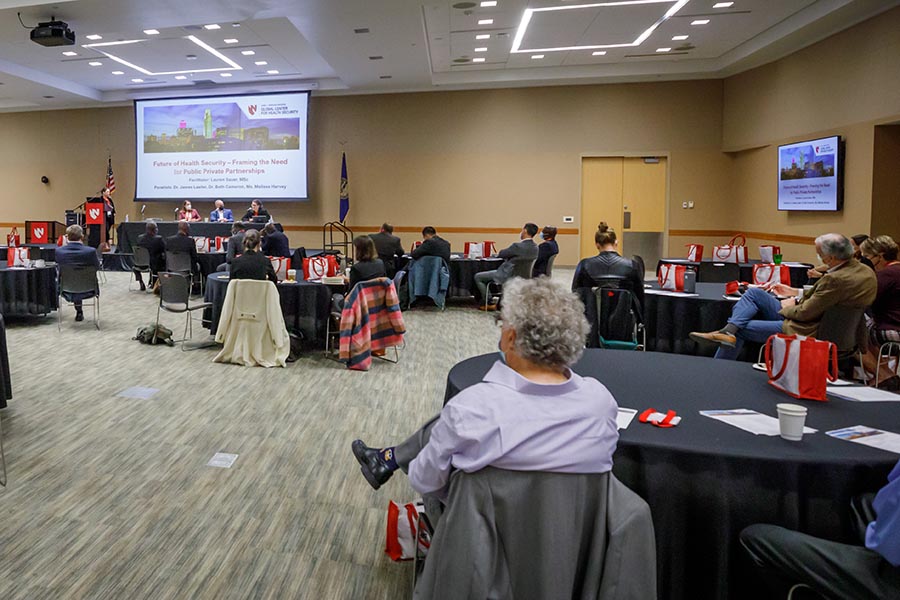
Never Again Summit Series
Never Again Summit Series
The Global Center for Health Security's Never Again: Pandemic Readiness Summit Series is a continuing sequence of chapters that focus on conversations on global health, pandemic readiness, and health security. We hope you join us for our next chapter in the near future. Check back soon for more information.
Chapter 1: October 19, 2022
In the first chapter of our Never Again: Pandemic Readiness Summit Series, we focused on how to lessen consequences of future pandemics. Attendees from across the globe "took part in several panel discussions on the benefits and need for new and expanded partnerships, as well as current perspectives on global health security. Breakout sessions were held to brainstorm and define necessary steps to create successful partnerships to combat current and future pandemic challenges."
Guest of honor, former U.S. Secretary of Defense and Senator Chuck Hagel spoke at the summit and "praised the work of the center while warning of challenges of future public health emergencies that lay ahead."

Chapter 2: January 30, 2023
In a follow-up event to the Summit’s October kick-off, GCHS hosted a webinar featuring a speaking engagement with Dr. Jeremy Farrar, MBBS, DPhil, a world-renowned epidemiologist and clinical scientist and a panel of emergency preparedness and response and highly infectious contagious disease experts.
During his presentation, Dr. Farrar opened by speaking to his experience in responding to the Nipah outbreak in which he said the lessons learned at the time still apply to the pandemic landscape today. He spoke to three main themes that he sees as integral in improving responses to disease outbreaks. This multifaceted, human-centered call-to-action included:
- Keeping communities at the heart of disease outbreak response.
- Treating pandemics as continuous events instead of singular, discrete occurrences.
- Rebuilding trust between the public and special pathogen experts and scientists.
To close his portion of the webinar, Dr. Farrar spoke to the importance of adopting practices of prevention with solid foundations in resilience. Speaking to the broader learned experiences the pandemic has taught, he stated, “What you have before a crisis hits really makes a difference when a crisis hits.” He emphasized that fractures in the areas of health care, inequality, manufacturing, politics, and mistrust become magnified during pandemics and thus require fixing in times of peace.
Following his presentation, Dr. Farrar joined a panel of distinguished experts to provide thoughtful insight in response to his ideas and field questions from those in attendance. In addition to Dr. Farrar, the panel was comprised of:
- James Lawler, MD, MPH, FIDSA, University of Nebraska Medical Center, Omaha
- John Lowe, PhD, University of Nebraska Medical Center, Omaha
- Lauren Sauer, MSc, University of Nebraska Medical Center, Omaha
- Brendan Carr, MD, Mount Sinai, New York City
- Richard Hatchett, MD, Coalition of Epidemic Preparedness Innovation, Washington, DC
Questions asked by panelists and the audience continued the forum discussion on needing to build trust within society, including within communities, between federal and non-federal entities, and among the broader population and scientists. It was addressed that transparency in data sharing, progress in science, and what is known and what has yet to be discovered all affect each facet’s trust and literacy of what is being presented as factually based and what narratives have been created to support a different agenda.
Panelists spoke to the idea that health is a whole society issue, meaning the health of a society has implications into other sectors of life such as education, economics, transport, and security. As such, a call for stronger bilateral relationships with national security programs and learning from the successes and failures of other non-public health institutions was made. In this vein, it was also mentioned there are existing systems and technology that can be built upon to strengthen the response to health security threats such as pandemics. Conversely, Dr. Farrar encouraged novel, innovative strategies rather than remaining restricted by "the way things have always been done."
Part two of the Never Again Summit Series provided a platform to continue a dialogue among colleagues about the advances in preparedness that may garner a better response to the next pandemic. The conversations emphasized approaching pandemics not as stand-alone events, but occurrences that should always be front of mind. Through this lens, experts suggest that the concepts of preparedness and response can be integrated into the composition of day-to-day life and thinking, even in times of health. Focus must be put on strengthening relationships between different sectors and strata of society to build trust and ensure the population has confidence in professionals to put their best interests first.
WATCH THE CHAPTER 2 SUMMIT VIDEO BELOW
For upcoming chapters of the series, make sure to check back and connect with us on Twitter, Facebook, and LinkedIn.